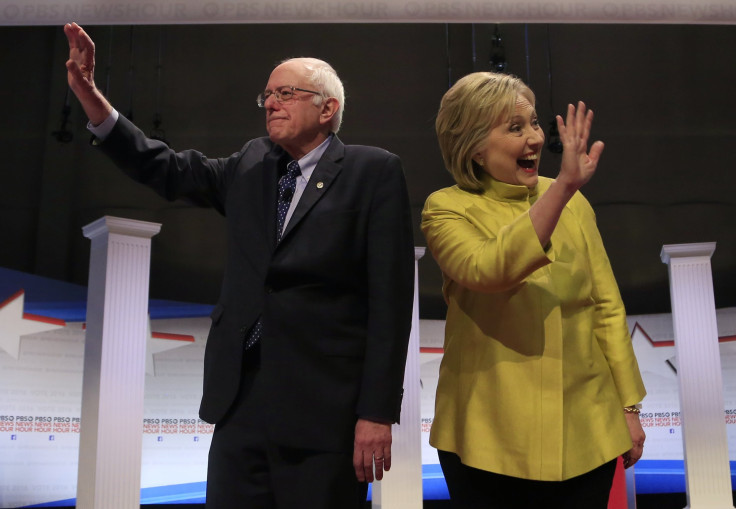Election 2016: Bernie Sanders, Hillary Clinton Say They Champion Women's Rights In PBS Democratic Debate

Democratic presidential candidate Vermont Sen. Bernie Sanders during the PBS debate Thursday looked to explain why he deserves the support of women on the campaign trail and dismissed the idea that former Secretary of State Hillary Clinton was the only candidate on the stage who would be an historic presidential pick.
Perhaps more interesting, though, is that while Sanders ticked off specific points in his record pertaining to how he has been a strong advocate for women in his public life, it was Clinton who was truly on the defensive after Sanders beat her in the demographic in the New Hampshire primary.
“I have spent my entire adult life working toward making sure that women are empowered to make their own choices,” Clinton said when asked by the debate moderators about her seeming lack of appeal among women. “Even if that choice is not to vote for me, I believe that it’s most important that we unleash the full potential of women and girls in our society.”
Clinton spoke in broad terms about her history advocating for women and noted several groups of women that support her. Sanders, for his part, mentioned specific issues like his record as a pro-choice advocate and an advocate for equal pay.
“I think a Sanders victory would be of some historical accomplishment as well,” Sanders said when asked if he would feel bad if he stopped Clinton from achieving the historic feat of becoming the first woman president.
"I feel very strongly that I have an agenda and I have a record," Clinton says without actually detailing what the important pts there are.
— Meredith Shiner (@meredithshiner) February 12, 2016
The two Democratic candidates are in an increasingly tight race for the party nomination that was not exactly expected one year ago. Sanders, basically coming from left field, has put up an impressive challenge to Clinton’s candidacy. As his polling numbers increased over the past several months, so too has he been able to push Clinton’s rhetoric to the left on a variety of issues like campaign finance reform and on banking regulations.
At the same time, however, Clinton has been attacking Sanders with questions about his electability in a general election, saying that his policy proposals are too unrealistic to be taken seriously. Sanders, for his part, says that he wants to ignite a political revolution to achieve his goals.
Even though Sanders narrowly missed a tie in Iowa and then beat Clinton handily in New Hampshire Tuesday, he still trails her in averages of national polls put together by Real Clear Politics. Clinton has a 13.3 point lead over the Vermont senator in national polls with 49.3 percent of the overall vote. In the next nominating state, Nevada, Clinton leads by 19.5 percent of the vote (disclaimer: the last poll conducted in the state was in December and results are generally viewed as unreliable). In South Carolina, which will hold its primary Feb. 27, just a week after the Nevada caucuses Feb. 20, Clinton leads by just under 30 percent over Sanders.
© Copyright IBTimes 2025. All rights reserved.






















